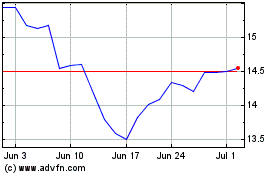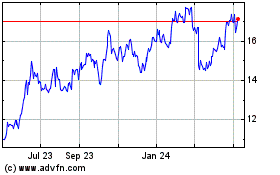By Juan Montes and Robbie Whelan
MEXICO CITY -- Mexico is preparing to auction rights to drill in
the oil-rich deep waters of the Gulf of Mexico, considered the
crown jewel of the country's energy industry, which only opened to
foreign investment three years ago.
Monday's auction is seen as the first major test of Mexico's
ability to work with the world's biggest players. At a time when
low oil prices are limiting production elsewhere, the deep-water
blocks have caught the attention of energy giants Exxon Mobil
Corp., Chevron Corp. and BP PLC, and state-owned firms Statoil ASA
of Norway and Petróleo Brasileiro SA of Brazil, among others.
The country's oil regulator hopes to award up to 10 unexplored
deep-water blocks and find an operating partner to take a 60% stake
in the Trion oil field, located offshore just south of the
U.S.-Mexico border, alongside national champion Petróleos
Mexicanos, or Pemex.
"In terms of the scale of the projects, this is the biggest
one," said Juan Carlos Zepeda, head of the National Hydrocarbons
Commission, referring to the deep-water auctions. Government
officials expect the cost of developing all 10 of the unexplored
blocks to be $34 billion over the next 15 years.
Since an ambitious overhaul opened up Mexico's oil industry to
foreign and private investment in 2013, there have already been
three public tenders, but they offered less-profitable shallow
water and inland blocks. Those auctions attracted some bigger names
such as Italy's Eni SpA, the world's largest oil companies largely
watched from the sidelines.
This time, expectations in the market are high.
"To have a household name operating in Mexico -- that's what
they really need in order to consider this a success. It would be
an enormous step." said Steven Otillar, a partner with the law firm
Akin Gump Strauss Hauer & Feld in Houston who has worked on
deals in Mexico's energy industry for two decades.
Pemex's production has been declining for more than a decade,
and the near exhaustion of Mexico's largest oil source, the
Cantarell shallow-water field, has forced Mexico to shift its
attention to deep water areas. Authorities estimate that around
half of Mexico's prospective oil resources lie in deep waters.
A successful tender would be a boost for a sluggish economy that
is facing a gloomy growth outlook, besieged by low oil prices,
steep budget cuts and uncertainty over bilateral trade following
Donald Trump's electoral victory in the U.S.
Oil prices have fallen 61% since mid-2014 and Pemex's production
has declined 38% since 2004, to 2.1 million barrels a day.
After 75 years of state monopoly, Mexican President Enrique Peña
Nieto took the audacious step of opening up the country's energy
sector as part of a broader economic overhaul intended to increase
competition and investment in key sectors.
Mr. Peña Nieto has made the energy reform the centerpiece of a
plan to reinvent heavily indebted Pemex and obtain lucrative
royalties from foreign investors to fund government programs.
Roughly 18% of Mexico's federal budget comes from oil.
"Production has been in decline for the last several years, so
having a way to reverse that decline is key for Mexico's finances,"
said Pablo Medina, a Latin America upstream analyst at energy
research firm Wood Mackenzie.
Analysts expect Trion won't produce its first barrels of oil for
eight to 10 years. "This is a long-term fix, but whoever joins
Pemex in Trion is going to have potentially a lot of upside," Mr.
Medina added.
The Trion field was discovered in 2012 and is thought to contain
about 485 million barrels of commercial reserves. Senior officials
at the Energy Ministry say they would be satisfied if four
deep-water blocks plus the partnership with Pemex in Trion are
awarded.
Pemex lacks the technical expertise to build the undersea
infrastructure necessary to drill for deep-water crude oil, and
joining with an experienced international firm was impossible
before the energy reforms. Developing the Trion field, for example,
will require an estimated investment of $11 billion.
"We don't have the resources, and we don't have the technology"
to produce deep-water oil without partners, said José Antonio
González Anaya, Pemex's chief executive.
The level of available reserves in the 10 unexplored blocks is
unclear, and oil companies will compete alongside Pemex for
exploration and production licenses. Four of the blocks are located
near Trion in the Perdido Fold belt, a deep water region where
giants such as Royal Dutch Shell PLC, Chevron and BP are already
producing oil on the U.S. side of the Gulf at a rate of about
65,000 barrels a day.
Analysts also will be watching closely to see if any major oil
companies make a formal bid for six additional blocks nestled in
the southern elbow of the Gulf of Mexico known as the Saline
Basin.
Much less is known about potential reserves in this area,
compared with the active fields in the northern part of the
Gulf.
The Saline Basin "is the Great Expectation," said Mr. Zepeda,
head of the oil regulator. "It's very risky, but you could find
something big."
Write to Juan Montes at juan.montes@wsj.com and Robbie Whelan at
robbie.whelan@wsj.com
(END) Dow Jones Newswires
December 02, 2016 14:37 ET (19:37 GMT)
Copyright (c) 2016 Dow Jones & Company, Inc.
Petroleo Brasileiro ADR (NYSE:PBR)
Historical Stock Chart
From Mar 2024 to Apr 2024

Petroleo Brasileiro ADR (NYSE:PBR)
Historical Stock Chart
From Apr 2023 to Apr 2024
